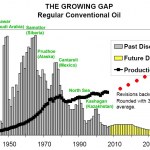oil
Stuart Staniford has a terrific piece that offers a little visual clarity about food, energy, unemployment and the Riots in the Middle East and North Africa:
Tunisia is a minnow in the global oil market, Egypt slightly more important. Algeria, however, matters a lot as its oil production is probably close to total demonstrated OPEC spare capacity. Thus serious social instability in Algeria would have major effects on global oil prices. If instability spread to bigger oil producers than that (eg Kuwait or UAE), the effects could be very dramatic.
Presumably, the regimes in those countries…
John Perlin has written an interesting Miller-McCune article about how the Pentagon has come to understand some of the problems associated with powering Iraq and Afghanistan operations - and how they're now reducing operations' energy consumption and embracing solar power.
Perlin describes the experience of Lt. Gen. Richard Zilmer, who assumed command of the coalition forces in Iraq's Al Anbar province in 2006 and soon realized that his command's reliance on trucking in liquid fossil fossil fules was contributing to casualties. In today's conflicts, Marine combat brigade uses half a million…
Anthony Perl says America doesn't have to wait for Congress in order to reduce oil consumption from the transportation sector.
by guest blogger Molly Davis
**my second and last blog entry from the ASPO-USA conference**
Discussions on Capitol Hill over the need to reduce fuel consumption often end up offering solutions that require significant movement on the part of policymakers. Pass a climate bill that puts a price on pollution? Pass an energy bill that mandates a high renewables supply? Pass a transportation bill that shifts highway funding to public transit? Easier said than done.
But Dr…
by Elizabeth Grossman
"After three long months of oil geysering continuously from the depths of the Gulf, a temporary cap has stemmed the flow and it appears that the well is on its way to being killed. But we are by no means through this disaster," said Senator Sheldon Whitehouse (D-RI) in his opening remarks at the August 4th Senate Environment and Public Works Committee hearing on the use of oil dispersants in the BP/Deepwater Horizon oil spill.
Gulf Coast fishermen and others whose livelihoods depend on the Gulf of Mexico's sea life know this all too well.
While the scientists testifying…
Someone tell me why we didn't nationalize BP assets in the U.S., fire the board of directors and other high-level managers, and then use the assets to fix all of the problems--including the unemployment caused by the spill. Because this sounds like the clarion calls of freedom and liberty to me (italics mine):
In the first few days after BP's Deepwater Horizon wellhead exploded, spewing crude oil into the Gulf of Mexico, cleanup workers could be seen on Louisiana beaches wearing scarlet pants and white t-shirts with the words "Inmate Labor" printed in large red block letters. Coastal…
Last week, I wrote about a column by biologist Marc Lipsitch, who described a conflict of interest for scientists that has not been discussed: gag agreements for scientists who accept industry funding. In other words, if the corporate funder doesn't like the results, nobody will hear about them. These agreements also present other problems, such as reviewing grant proposals or receiving federal funding, as the scientist will have access to information that is unknown and undiscussed*.
Well (pun intended), BP appears to have tried this strategy too (italics mine):
BP has been trying to hire…
And for BP's share price. Though in fact I came to this the other way round: the rise in BP's share price reflects a gradual re-pricing of the risk and damage extent, as well as the more recent news that the new cap-fitting seems to have gone well.
[Update: speaking of political risk - this is the kind of thing I mean -W]
[http://www.bbc.co.uk/news/world-us-canada-10654584]
By Elizabeth Grossman
"I've never seen anything like it," says David Willman, who has nearly 15 years' experience captaining supply boats that support oil rigs and drilling platforms in the Gulf of Mexico. "We're seeing pods of whales and dolphins out in the oil and lots of dead things," he tells me. "Things I've never seen before coming up from the deep that look like sea cucumbers floating dead. Man o' wars floating dead with shriveled tentacles." Willman is captain of the Noonie G., an 111-foot supply boat owned by Guilbeau Marine, a company based in Cut Off, LA. He's been working out of…
BP: not only trashing our oceans, but the First Amendment too! From Raw Story:
Journalists who come too close to oil spill clean-up efforts without permission could find themselves facing a $40,000 fine and even one to five years in prison under a new rule instituted by the Coast Guard late last week.
It's a move that outraged observers have decried as an attack on First Amendment rights. And CNN's Anderson Cooper describes the new rules as making it "very easy to hide incompetence or failure."
The Coast Guard order states that "vessels must not come within 20 meters [65 feet] of booming…
The reason your dividends were (past tense) higher than U.S. Treasury yields is because there was risk involved in this investment, even if you pretended otherwise. That's why you get more money back--because you're holding more risk. Privately held companies are not back by the full faith and credit of sovereign states. Welcome to the Downside.
And you are in a risky investment: poking holes in the earth. There's good stuff in the earth, but sometimes the earth pokes back. That confers risk.
If this prospect seems less attractive, might I suggest U.S., U.K., and Japanese securities?…
President Obama has been arguing that if he had tried to regulate the oil industry before the BP disaster, it would have gone nowhere and Republicans would have pissed and moaned about oppressive regulations:
In an interview with POLITICO, the president said: "I think it's fair to say, if six months ago, before this spill had happened, I had gone up to Congress and I had said we need to crack down a lot harder on oil companies and we need to spend more money on technology to respond in case of a catastrophic spill, there are folks up there, who will not be named, who would have said this is…
Oil supplies the United States with approximately 40% of its energy needs. Billions upon billions of gallons are pumped out of our wells, brought in from other countries, and shipped around to refineries all over the states. 1.3 million gallons of petroleum are spilled into U.S. waters from vessels and pipelines in a typical year. Yes, it would be great if we never spilled a drop of oil. No matter how hard we may try, though, the fact is that nobody is perfect, and oil spills are an inevitable consequence of our widespread use of oil. The question is, once the oil is out there, how do we…
Ezra Klein makes a great catch:
Obama has also called in some of the many scientists on the federal payroll, led by Energy Secretary Steven Chu, a Nobel Prize-winning physicist. Chu at one point pushed the unusual idea of using gamma rays to peer into the blowout preventer to determine if its valves were closed, a technique he experimented with in graduate school while studying radioactive decay.
The suggestion at first elicited snickering and "Incredible Hulk" jokes. Then they tried it, and it worked. "They weren't hot on his ideas," a senior White House official said of BP's initial…
Melanie Trottman reported in the Wall Street Journal last week that US Representatives James Oberstar and Jerrold Nadler have demanded that Gulf response and recovery workers be provided with respirators (among other protective equipment), but OSHA doesn't think respirators should be required:
David Michaels, assistant secretary for the Department of Labor's OSHA, said in an interview Thursday that based on test results so far, cleanup workers are receiving "minimal" exposure to airborne toxins. OSHA will require that BP provide certain protective clothing, but not respirators.
The "based on…
By Elizabeth Grossman
Expressions of concern for oil spill response workers' health and safety grew this past week as reports arrived by way of the Louisiana Environmental Action Network that BP was denying workers' requests for respirators. On June 4th, the Wall Street Journal reported that Representatives Jerrold Nadler (D-NY) and James Oberstar (D-Minn) had written to the EPA and Department of Labor demanding that all response workers be provided with "proper protective equipment, including respirators."
Anna Hrybyk, program manager of the Louisiana Bucket Brigade, also reports that in…
Having spent most of Thursday travelling from San Diego to Boston, I had the distinct displeasure of watching cable news. First point: it still sucks. But the constant theme was that Obama is on the defensive about the BP oil rig blowout. Sure, it's stupid, although I think Obama was too ready to rely on BP's expertise (eveni f you don't believe that parts of the operation could be handled by the government, then bring in other oil companies for advice).
But a problem Obama faces is that, on issue after issue, he has fallen far short of what the rank-and-file wanted (and often what he ran…
By Elizabeth Grossman
It's now a month since the Deepwater Horizon well exploded, and the oil continues to flow. By official count, the response now involves 27,400 civilian and military personnel, 11,000 volunteers, more than 1040 boats, dozens of aircraft, and multiple offshore drilling units.
As more and more people become involved, health and safety precautions for responders are becoming increasingly important. "How many lessons have we not learned from the Exxon Valdez experience and how many mistakes are being repeated in a worse way?" asks Mark Catlin, who has set up a Facebook group…
From the "I-never-thought-I'd-use-this-class" file, I took a semester course once from an oil spill expert. Professor Ed Gilfillan had studied the response of Prince William Sound to various clean-up regimens following the wreck of the Exxon Valdez, and we spent weeks learning about chemistry of oil spills and the factors involved in ecological recovery. The class was over 15 years ago, mind you, and in retrospect I remember only two things.
But these are two very key things, and they are both relevant to the ongoing tragedy in the Gulf of Mexico.
1. The soil structure at the coastline will…
(from here)
Obama's kinder, gentler "Drill, baby, drill" is looking very short-sighted. We can only hope he has learned that when you use your party loyalists as foils and adopt a center-right compromise, so that you can claim to have boldly discarded the "the tired debates between right and left", that there is a potential pitfall: your party loyalists might actually be correct on the merits. Consider oil drilling (italics mine):
UPDATE via the Wonk Room: Repeating a GOP/Oil industry sounding talking point, earlier this month the President said:
It turns out, by the way, that oil rigs…
I shouldn't complain - the Telegraph's energy columnist, Rowena Mason is technically affirming that even non-crazy people can believe in peak oil. Her essay, titled "You Don't Need to be a Mad Max Survivalist to Take Peak Oil Seriously" at least acknowledges the point. Her equation of Mad Max survivalism with "grows root vegetables" is obviously going to annoy me, but I know the kind of people she talks about in the article too, the ones who say we'd better hurry into our bunkers now, so I can forgive that.
But the part that is a little problematic is that she doesn't seem to get the oil…


